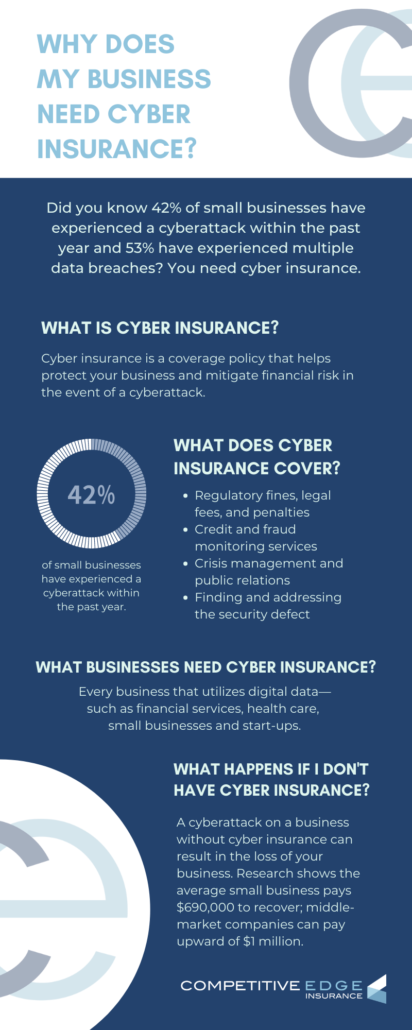Why Does My Business Need Cyber Insurance?
Did you know, according to Advisorsmith and Insurance Journal, 42% of small businesses have experienced a cyberattack within the past year and 53% have experienced multiple data breaches?
Cyberattacks target personally identifiable information, personal health data as well as confidential financial information and can result in significant and often devastating financial loss for your business. In fact, the National Cyber Security Alliance found that 60% of small businesses that fell victim to a cyberattack were forced to close within six months due to the high financial costs necessary to recover.
Read our full guide on why your business needs cyber insurance, as well as how you can protect your business from these risks below.
What is Cyber Insurance?
Cyber insurance is a coverage policy that helps protect your business and mitigate financial risk in the event of a cyberattack. Retrieving your company data and rebuilding your systems is time-consuming and costly.
In addition, the loss of time and productivity, when a data breach does occur can damage your credit, damage your reputation with customers, cost you in service providers restructuring your security, and prevent further losses and possible penalties for improper handling of sensitive financial data.

What Does Cyber Insurance Cover?
Coverage can vary depending on the policy, however, cyber insurance generally covers:
- Regulatory fines, legal fees, and penalties
- Credit and fraud monitoring services
- Crisis management and public relations
- Finding and addressing the security defect
- Notifying customers of a data breach
- Restoring personal identities of affected customers
- Recovering compromised data
- Repairing damaged computer systems
What Businesses Need Cyber Insurance?
Every business that uses digital data—such as saving client information to your network or cloud—needs cyber insurance. However, some businesses are more heavily targeted by cybercriminals because of their valuable data and resources, such as:
Financial Services
According to Business Insider, financial firms are 300 times more likely to be targeted than other companies. Wow!
Financial services are specifically targeted because of their access to financial accounts and/or services such as allowing customers to pay bills online, transfer funds, and view account balances.
Financial institutions including the Securities and Exchange Commission, Equifax, HSBC, Lloyds Banking Group, JPMorgan as well as many other firms have all experienced cyber breaches and attacks.
Health Care
Health care organizations are responsible for significant amounts of sensitive information and, as a result, could potentially put the private records of millions of patients at risk. HIPAA Journal reports that 89% of healthcare organizations have experienced a data breach.
Small Businesses and Start-Ups
Small businesses are often targeted by cybercriminals because of their limited resources and lack of security expertise. According to the National Cyber Security Alliance, 83% of small businesses have no formal cyber security plan and 69% have no plan at all.
What Happens to My Business If I Don’t Have Cyber Insurance?
A cyberattack on a business without cyber insurance can result in the loss of hundreds of thousands of dollars between:
- Various legal fees and fines
- Recovery of compromised data
- Damaged computer systems
- And other necessary costs
According to the Ponemon Institute, the average small business pays $690,000 to recover from a cyber-attack, whereas middle-market companies can pay upward of $1 million.
Due to the devastating financial fallout, many businesses that experience a cyberattack without cyber insurance can’t recover and are forced to permanently close their doors.
Cyber insurance is a rapidly growing space and constantly evolving to fit the needs of any business. With the right policy, you can protect your business from the high costs and destructive effects of a cyberattack.
To learn more, read on for seven steps to avoid cyber security threats.
